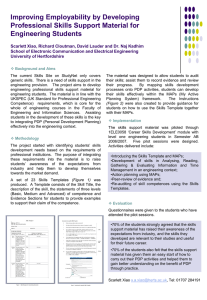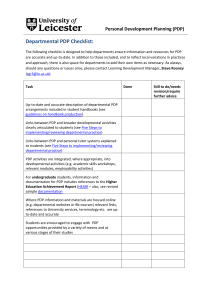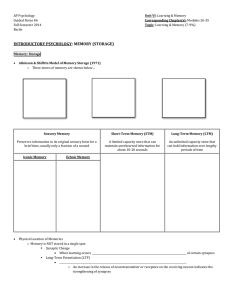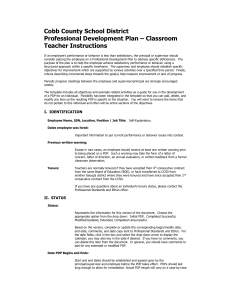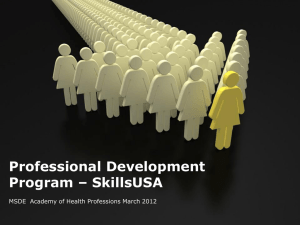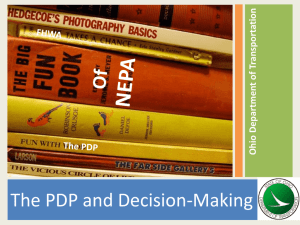Powerpoint presentation about PDP
advertisement
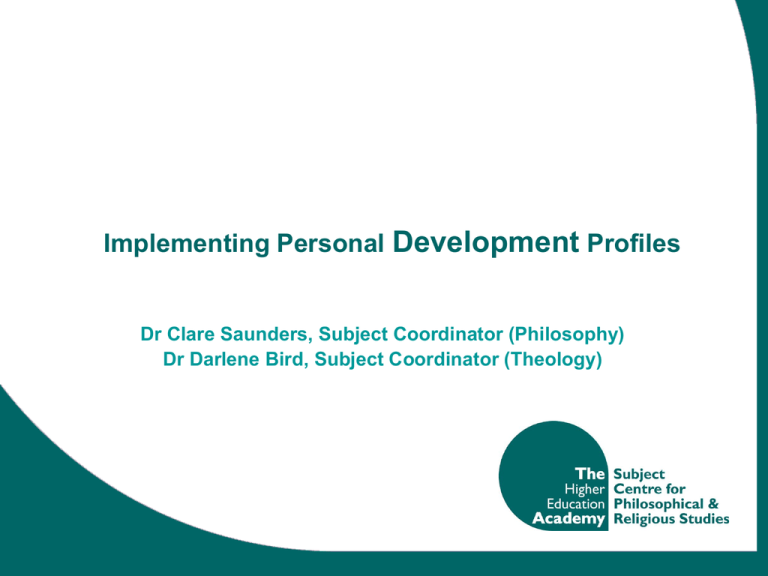
Implementing Personal Development Profiles Dr Clare Saunders, Subject Coordinator (Philosophy) Dr Darlene Bird, Subject Coordinator (Theology) The ‘what’ and ‘why’ of PDP… • What: ‘a structured and supported process undertaken by an individual to reflect upon their own learning, performance and/or achievement and to plan for their personal, educational and career development’. • Why: to help students – - become more effective, independent and confident self-directed learners ; - understand how they are learning and relate their learning to a wider context; - improve their general skills for study and career management; - articulate their personal goals and evaluate progress towards their achievement; - and encourage a positive attitude to learning throughout life. (information from Centre for Recording Achievement) Some student responses to PDP* • ‘I was surprised, it seemed to be a waste of time at first, but I now realise what a help doing some planning can be.’ • ‘Recording helped me realise what I have learnt this year.’ • ‘I know I should be using it more, I am not good at this sort of thing, so having to do it for my tutor would be useful.’ • ‘I assess what I am doing myself, I don’t need a book to help me.’ • ‘My first year tutor did lots on this with us, but the one we have now said he thought it was a waste of time so I haven’t looked at it since last summer.’ *taken from comments made by students in Geography and Earth Science (courtesy of Prof Pauline Kneale, School of Geography, University of Leeds) Student response to survey (87 UG in Geography surveyed) • Your PDP is private to you. Do you want staff to write in it? – 80% responded ‘yes’ – ‘It needs to be a dialogue, otherwise I cannot be interested.’ • When should it be done? – ‘I think time should be set aside for them so it does not feel a hassle’ – ‘Each term is about right’ (majority) Response to survey • Question on format and style of PDP - ‘PDP with open ended questions allows more effective reflection’ - ‘I like tick boxes as well as general questions’ - ‘It should not be in the form of tick boxes as this encourages laziness’ - ‘Tick boxes are good’ - ‘I think it should be open and not constrained or structured, this way people give their honest views how they see it rather than accommodate a structured method’ - ‘Suggest a mix of styles and prompts would be useful’ Self-Audit • What are you already doing - or what have you done in the past - in your department that might be considered a kind of proto-PDP? ‘SWOT’ Analysis What, for you, are the… » Strengths » Weaknesses » Opportunities » Threats … re: using PDP? ‘SWOT’ Analysis (contd.) Strengths Weaknesses • • Opportunities Threats • • Paper vs electronic PDP • What do e-portfolios look like? http://www.eportfolios.ac.uk Username: demo724 Password: yellow520% • Samples of paper-based PDP PDP – ‘Why Bother?’ Some concerns about PDP?... • • • • More demands on staff (& student) time More paperwork Just paperwork – what’s the point? Students have already done this at school (e.g. National Records of Achievement); why do it again? ‘Why Bother?’ – Universities UK’s answer “The primary objective for PDP is to improve the capacity of individuals to understand what and how they are learning, and to review, plan, and take responsibility for their own learning, helping students: • become more effective, independent and confident self-directed learners; • understand how they are learning and relate their learning to a wider context; • improve their general skills for study and career management; • articulate personal goals and evaluate progress towards their achievement; • and encourage a positive attitude to learning throughout life.” Guidelines for HE Progress Files ‘Why Bother?’ – some benefits for students • A structured, systematic framework for recording, and reflecting on, all aspects of their HE experience – Drawing together different aspects of (esp. modular) course – Scope for including extra-curricular activities too • Identifying, and addressing, areas of strength and weakness – this can be used to inform, e.g. – Module choice – Improving performance on assessed work – Job seeking • Identifying and developing skills valued by employers – Evidence for use in job applications, interviews etc. – Skills for continuing professional development (CPD) ‘Why Bother?’ – some benefits for staff • A framework for encouraging, and enabling, greater independent learning • A structure for tracking student progress, identifying and addressing areas of concern – useful for – Student retention – Student achievement (within and beyond their degree programme) • More and better information for preparing student references • A systematic approach – Drawing together, and making explicit, existing good practices (as discussed in our ‘audit’) – Useful evidence for (e.g.) institutional audit – addressing HE agendas (progress files, ‘student success’, employability) How to motivate participation in PDP – for staff? • Ensure that it ‘fits’ with existing departmental practices & priorities – E.g. personal tutoring system – avoid duplication of work – Use to support student retention & achievement • A reflective approach is something that we all, already, use and value – PDP need not be something ‘different’ or ‘extra’ – ‘Lifelong learning’ approach; PDP CPD How to motivate participation in PDP – for students? • Ensure that we communicate (explicitly) the potential benefits of PDP (as discussed earlier)! • Not just ‘more of the same’ (cf. school Records of Achievement) • Lead by example! – if staff value PDP, so will students • Recognise their efforts (accreditation?) • Emphasise link with employability – Employers value graduates who are reflective, and capable of managing their own learning, personal & professional development – But they are generally interested in the PDP process, rather than the product (progress files)… PDP & Student Employability – examples • Skills development – Subject-specific skills profiles (Subject Centre for PRS) – including: • ‘mapping’ of TRS graduates’ abilities against employer requirements • ‘reflective questions’ to aid TRS graduates in identifying and articulating their capabilities • Modelling PDP on employers’ CPD processes – NTF project (University of Leeds) • Based in Geography, but largely generic in content • Includes some public sector & charity examples • http://www.geog.leeds.ac.uk/courses/other/performance/pdpindex.html Discussion Questions • How do these approaches relate to your department? – What you are already doing – What you would like to do – Anticipated problems? • Any other issues?.... … Thank you! Darlene & Clare http://prs.heacademy.ac.uk CPD Example (Save the Children) LEARNING & DEVELOPMENT PLANNER Name: Dept/Programme: Page no: WORK OBJECTIVES: list briefly: Effective xxxxx team recruited, inducted and managed to achieve project objectives NEEDS LEARNING OBJECTIVES HOW THEY WILL BE MET TIMESCALE What learning needs have you identified to achieve the agreed objectives? What should the staff member know, be able to do or how will they approach work, after the learning, to achieve the work plan objective? What cost effective methods or media might be suitable which also relate to how the staff member learns best? When should the learning have been completed? e.g. Build effective new team of six for short term project eg Member of staff should know: overview of how teams form, develop and work be able to: design and deliver individual and team activities or approach work: n/a in order to achieve the objective. Preferred learning style 'Theorist' Methods: self learning from Team development materials from Learning Resource Centre. Coaching with manager? One day facilitation skills course. Estimated costs (discuss with HRD) By 30 4 02 HEALTH AND SAFETY: Record any learning and training needs as a result of discussion on H&S checklist PRIORITY H,M,L? OUTCOMES AND REVIEW COMMENTS Use for notes from Supervision and review meetings H Realistic time commitment: Will discuss dedicated time for self study. 1/2 DAYS ONLY FOR TRAINING PDP & CPD – resources • Creating Development Plans – – • Activities to promote reflective writing for PDP – – • Goal setting for a project, module, placement or semester using BAE Systems planners Reviewing performance against goals using Woolworth’s criteria Incidents and achievements, preparation for interviews with Bradford Metropolitan District Council Assessing personal competencies with BNFL, preparing for interviews. Planning for the longer term – – • Self-regulated learning - how do you complete academic activities? Reflecting on personal experience with Avenade How do I learn? Reflecting on personal experience with Avenade Activities related to goal setting – – – – • What does a Development Plan look like? Comparing your current practice with company procedures at Woolworths or HBOS Personal Development: Reviewing a year, the CRAC approach Setting longer-term goals using BAE Systems planner Valuing your degree skills, preparing for interviews with Career Development Activities – – Planning for the Future using Somerfield’s template How will you be managed? Research and reflection based on Avenade / Bradford Metropolitan District Council’s / Environment Agency’s approach http://www.geog.leeds.ac.uk/courses/other/performance/docs/Section1home.html
